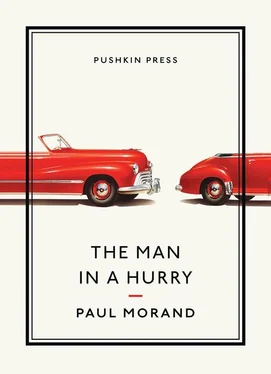“Regencrantz, I don’t like being made a fool of… You have either said too much or not enough. You care for me as a friend. Don’t make that odd face. What I want to know is whether I’m done for or not. Are you sure it’s not intercostal?”
Regencrantz’s lips opened, ready to give a harsh verdict.
“Classic stenocardia, unfortunately.”
In a deep silence, Regencrantz could hear a blackbird whistling, a car pass by. But none of Pierre’s senses were focused on the outside world any longer.
“I know it’s relentless, but sometimes one can live for years,” he said very quietly at last.
“Sometimes,” replied Regencrantz, without much enthusiasm.
Pierre had plunged into a murky, suffocating world where no light or sound reached him.
“How should I consider my attack? As a warning?”
“Yes.”
“I’ll have many others… I’ll know when I’m nearing the end… I’ll know, won’t I?”
Regencrantz lectured him.
“No chlorides… No tobacco… No staircases.”
“None of that is of any interest to me, my dear Regencrantz. One thing alone concerns me, you must understand: I absolutely insist on knowing at what time death will knock at my door.”
Regencrantz said nothing, watching Pierre constructing his assumptions like castles of cards.
“What!” Pierre continued, pressing the point, “I really will see death approaching? Don’t tell me otherwise, I have arrangements to make.”
“Your heart is really thumping. Your left ventricle is not a friend you can depend on when times are bad: that is all I can tell you with any certainty.”
“I’m not asking you to cure me, Regencrantz, I know that one doesn’t recover. I’m simply asking you to mark out the path… to tell me as precisely as possible how many attacks will there be along the road that leads me to… the cemetery.”
“In your heart’s present condition,” Regencrantz replied slowly, “if I’m to tell you what I think deep down, I don’t believe that you would survive another attack.”
“The next one would finish me off?”
“Oh, no…” said Regencrantz hesitantly.
The conscientious doctor prevailed over his friend.
“It’s very likely,” he said drily.
Pierre raised his arms as though he were sinking.
Pierre goes home.
He is a prisoner here between his four walls.
Up until now, the reassuring, breathing parts of a room for him are not the walls, but the doors and windows, because doors open onto what is new, doors allow you to leave; windows are friends; you can cast your eyes through windows, you can throw money out of them, you can communicate with the living. Pierre no longer expects anything at his door; he no longer pays any attention to that window that overlooks a labyrinth with no exit.
He repeats the conversation with Regencrantz to himself: “Do you mean to say, Regencrantz, that the next time…?”—“It’s likely.”
Not a trace of mobility or agility in Pierre any longer. He appears to be stuck in cement. He enjoys thinking, but he has lost his sensitivity, he no longer moves around. His footsteps seem as useless to him now as cries from the bottom of a dungeon.
Everything is blocked. There are guards at all the exits. No means of escape.
A DAGGER THRUST to the heart: the victim takes a few more steps before falling down dead. A great misfortune can strike and numb simultaneously in this way, paralysing our emotions and anaesthetizing the imagination, while our intelligence goes on ticking over.
The physical assimilation of the disaster begins much later.
We carry the impact within us like a deferred ending whose practical applications we lie in wait for as we glimpse the infernal machine.
Pierre did not fall asleep until the morning. He had spent the night trying to comprehend, forcing himself to translate, no longer into words but into mental images, the great adventure he had embarked upon. He was not in pain, he was not shaking. It seemed to him that all this was happening to someone else. When sleep came, Pierre welcomed it like someone taking opium before enduring torture.
At nine o’clock he woke with a start, thrown from his bed by that sinister music that had not left him when he was asleep and that kept repeating Regencrantz’s words: “It’s likely… it’s likely… it’s likely.”
“What’s to become of me?” he said to himself out loud.
Hearing his own voice piercing the silence, he was seized with a nameless terror. The threat of losing his mind suddenly loomed over him. For the first time, he considered how destructible he was, how easy to upset, how fated he was to be destroyed.
“I am doomed.”
He repeated these words, imagining his defeat, his decline and the advance of the invisible enemy towards him.
He remembered stories about people sentenced to death: some show off and curse their executioners, some set themselves up as heroes, while others create fear around them. Pierre envied them: their death had a human aspect at least, a human cause, a date set by human will-power. They are part of what is known and is even commonplace. It is men who have convicted them, men who will come to their aid or who will execute them. Up until their final moment, they will be dealing with men, men for them to plead with or stand up to.
He was entirely on his own and was waiting for something that was absolutely impossible for him to imagine.
“A masked death,” he wondered.
He leant against the wall, his eyes staring. Before him, on the tablecloth, set out lovingly the previous day, lay his most recent acquisitions: a gilt chalice, a sacramental ambry, a length of Sicilian silk.
“What am I going to do with all these?” he said to himself with a perplexed air.
Mechanically, he unfolded the silk, the colour of dried blood.
“It’s like the colour of Hedwige’s dress.”
The thought of Hedwige struck him with such force that he staggered. He felt pain for the first time. It was so unbearable that he feared he might die then and there. The frightened reaction of someone who was very ill spurred him towards his bed where he lay down, breathing carefully.
The mid-morning sun warmed his feet, but he no more felt it than he heard the sparrows singing or the pair of doves cooing. With open eyes, he carefully preserved the calm expected from darkness and closed eyelids. A sense of peace came over him suddenly, the doldrums of the tropics, when the sails of yachts are limp and their reflection in the still water looks like a vampire with its head hanging down from the ceiling.
Fear had left him; fear projects itself into the future and for the time being it was impossible for him to think of the future. A fleeting joy came over him at the thought that his death was a purely individual adventure and one that would only happen to him. (Morally and materially, Hedwige was taken care of.) Was it because death was to cut the thread of his days so prematurely that fate had caused him to live alone so much?
“I’m going to have to organize my life,” he said.
The absurdity of this remark made him smile.
“Organize what is already no longer… And yet if I were a believer, what wonderful days would lie ahead!”
A phrase of Turenne’s came back to him: “I should like to place some time between my life and my death.” Pierre had moved into this no man’s land. It was up to him to make God’s kingdom out of it.
But he had always lived without God. Uniquely focused on day-to-day realities, the materials for his future constructions, lacking any metaphysical anxieties and indifferent to death, which he never graced with a single thought, he neither denied nor accepted the afterlife; he was simply not bothered with it, having other things to do, frenziedly having to pursue a destiny that had now left him alone beside the grave.
Читать дальше












